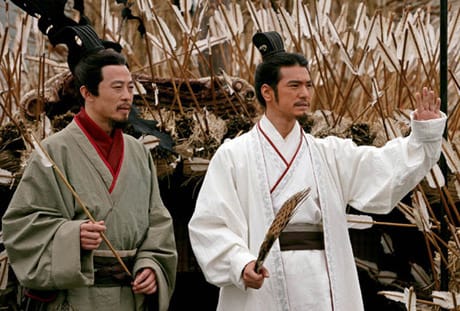John Woo's Red Cliff arrives on these shores with a big disadvantage. Asian audiences saw Woo's $80 million historical spectacle in two separately released instalments, running 146 and 142 minutes. But for the version opening in North America, Woo has edited both versions into a single film, running only 150 minutes. One can only assume, and hope, the original version was less sketchy than this, or else Woo's much-hyped return to Asia is another in his recent string of disappointments.
The U.S. version of Red Cliff begins with a "we join our programming already in progress" vibe, with a manly-voiced American narrator introducing the main characters in an opening scene that abruptly sets the stage: in 208 A.D., Chinese Prime Minister Cao Cao (Zheng Fengyi) urges Emperor Xian (Wang Ning) to allow his armies to combat powerful southern warlords Liu Bei (You Young) and Sun Quan (Chang Chen). Liu's strategist, Zhuge Liang (Takeshi Kaneshiro), and Sun's commander, Zhou Yu (Tony Leung), form an alliance and, being a John Woo film, the blood starts pouring.
The build-up to the battles feels rushed, with characters never becoming anything more than broad hero/villain archetypes. The U.S. version, heavy on action and relatively light on character, uses more footage from the second part, where the actual Battle of Red Cliff and the many other action scenes reside. Split into two films, the elaborate action would probably be thrilling, but here it becomes repetitive and wearying.
It's unfair to give a definite verdict based on this bastardization, but a few things seem indisputable. This is a handsome production, with convincing period detail of the waning days of the Han Dynasty. It possesses a truly epic scope, with impressive scenes of hundreds of extras, recalling the type of grand filmmaking that doesn't get made anymore, making the occasional CGI crowds doubly distracting. And Woo can still create a memorable image: a shot of a dove flying past naval artillery and into a military base is particularly thrilling.
It must also be said that Woo, always a masculine director, still can't craft a female character worth a damn ― Zhou's ridiculously pure wife (Vicki Zhao) is saddled with some truly corny dialogue ― and that the usually excellent Tony Leung isn't an imposing enough figure for his role. He reportedly took over at the last minute from Chow Yun-Fat, who would have fit much better.
For Woo, whose Hollywood career never matched his brilliant Hong Kong work, Red Cliff promised a return to form. Too bad you'll have to get a Chinatown bootleg to see if he succeeded.
(E1)The U.S. version of Red Cliff begins with a "we join our programming already in progress" vibe, with a manly-voiced American narrator introducing the main characters in an opening scene that abruptly sets the stage: in 208 A.D., Chinese Prime Minister Cao Cao (Zheng Fengyi) urges Emperor Xian (Wang Ning) to allow his armies to combat powerful southern warlords Liu Bei (You Young) and Sun Quan (Chang Chen). Liu's strategist, Zhuge Liang (Takeshi Kaneshiro), and Sun's commander, Zhou Yu (Tony Leung), form an alliance and, being a John Woo film, the blood starts pouring.
The build-up to the battles feels rushed, with characters never becoming anything more than broad hero/villain archetypes. The U.S. version, heavy on action and relatively light on character, uses more footage from the second part, where the actual Battle of Red Cliff and the many other action scenes reside. Split into two films, the elaborate action would probably be thrilling, but here it becomes repetitive and wearying.
It's unfair to give a definite verdict based on this bastardization, but a few things seem indisputable. This is a handsome production, with convincing period detail of the waning days of the Han Dynasty. It possesses a truly epic scope, with impressive scenes of hundreds of extras, recalling the type of grand filmmaking that doesn't get made anymore, making the occasional CGI crowds doubly distracting. And Woo can still create a memorable image: a shot of a dove flying past naval artillery and into a military base is particularly thrilling.
It must also be said that Woo, always a masculine director, still can't craft a female character worth a damn ― Zhou's ridiculously pure wife (Vicki Zhao) is saddled with some truly corny dialogue ― and that the usually excellent Tony Leung isn't an imposing enough figure for his role. He reportedly took over at the last minute from Chow Yun-Fat, who would have fit much better.
For Woo, whose Hollywood career never matched his brilliant Hong Kong work, Red Cliff promised a return to form. Too bad you'll have to get a Chinatown bootleg to see if he succeeded.
